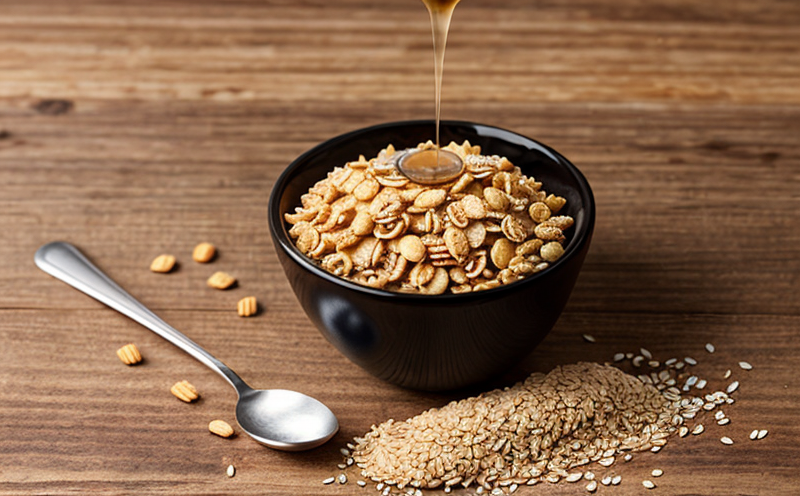Differential Scanning Calorimetry DSC Analysis Test
The Differential Scanning Calorimetry (DSC) analysis is a powerful analytical technique used to measure the heat flow to or from a sample as a function of temperature, under constant heating or cooling conditions. This method provides insights into thermal behavior and phase transitions in various materials, including cereals and grains. In food & feed testing specifically, DSC can help identify moisture content, protein denaturation, amylopectin gelatinization, and other critical properties that impact quality, safety, and shelf life.
For instance, in the case of cereal grains like wheat or corn, understanding the gelatinization temperature is crucial for optimizing processing conditions to ensure optimal cooking performance. Similarly, determining protein denaturation temperatures can help in assessing the integrity of proteins during storage and handling. The DSC test also aids in detecting impurities that might affect the final product's quality.
The technique operates by placing a sample and an empty reference cell into the DSC instrument. As the temperature is raised or lowered, heat flow to or from the sample is measured relative to the empty reference cell. Any endothermic or exothermic event in the sample indicates a phase transition or chemical reaction.
The primary apparatus used for this test includes a controlled-temperature furnace and a calorimeter where the sample and reference are placed. The software accompanying the DSC instrument processes the data collected during the scan, providing a thermogram—a graphical representation of the heat flow as a function of temperature.
| Parameter | Description |
|---|---|
| Sensor Type | Tantalum or Alumina |
| Heating Rate | 10°C/min to 50°C/min |
| Temperature Range | -100°C to +350°C |
| Data Collection | Digital thermogram with resolution of ±0.2°C |
The test follows ISO standards such as ISO 11357-6, which provides guidelines for the use of DSC in the food industry. The acceptance criteria include a reproducibility within a specific margin to ensure accurate and reliable results.
In summary, Differential Scanning Calorimetry is an essential tool for quality managers and R&D engineers looking to optimize processing parameters, ensure product integrity, and maintain compliance with international standards. By providing detailed insights into the thermal behavior of cereals and grains, DSC analysis helps in making informed decisions that enhance product quality and safety.
Why It Matters
The significance of Differential Scanning Calorimetry (DSC) in cereal & grain testing cannot be overstated. This technique offers unparalleled insights into the thermal properties of materials, which are critical for ensuring product quality and compliance with industry standards.
Understanding the gelatinization temperature of starches is crucial for optimizing cooking processes. Incorrect cooking can lead to undercooked or overcooked products, affecting both texture and nutritional value.
DSC helps in identifying changes in protein structure during processing, which can impact the final product's functionality and shelf life. Monitoring these changes ensures that the end product meets consumer expectations.
The test also aids in detecting impurities or adulterants in cereals and grains. Even small amounts of contaminants can significantly alter the sensory properties and nutritional profile of the food, making DSC a vital tool for quality assurance.
Moreover, compliance with international standards such as ISO 11357-6 is essential to ensure that products meet regulatory requirements. This not only protects consumers but also enhances brand reputation by demonstrating commitment to high-quality standards.
In conclusion, Differential Scanning Calorimetry plays a pivotal role in the food & feed industry by providing detailed thermal data that informs critical decisions related to product quality and safety.
Scope and Methodology
The scope of Differential Scanning Calorimetry (DSC) analysis in cereal & grain testing encompasses a wide range of applications, from identifying moisture content to assessing the stability of proteins during processing. The methodology involves precise sample preparation, controlled temperature conditions, and careful data interpretation.
Sample Preparation: Clean samples are prepared by grinding or sieving as per the specified particle size. This ensures consistent results across multiple tests.
Temperature Control: Samples are heated or cooled at a constant rate to observe any thermal changes, ensuring that all data points are within the acceptable range for accurate analysis.
The DSC instrument records heat flow as a function of temperature, providing thermograms that reveal critical information about phase transitions and chemical reactions. The software accompanying the instrument processes this data, offering detailed insights into the thermal behavior of the samples.
| Sample Preparation | Description |
|---|---|
| Grinding/Sieving | To achieve uniform particle size and ensure accurate measurement. |
| Weighing | Precise weighing of the sample to within ±0.1 mg for consistency in testing. |
| Instrumental Setup | Ensuring that the sample holder is correctly installed and the reference cell is empty. |
The acceptance criteria for DSC analysis are based on ISO standards, ensuring reproducibility and reliability. The results should be within specified limits to meet regulatory requirements and ensure product quality.
In summary, Differential Scanning Calorimetry provides a comprehensive scope of application in cereal & grain testing, offering detailed insights into thermal behavior that are essential for optimizing processing parameters and ensuring product integrity.
Quality and Reliability Assurance
Calibration: The DSC instrument undergoes regular calibration to ensure accurate heat flow measurements. This involves using reference materials with known thermal properties.
Data Validation: All data points are cross-verified against industry standards such as ISO 11357-6 to ensure accuracy and reliability.
The quality assurance process includes strict adherence to standard operating procedures (SOPs) for sample preparation, testing, and data analysis. This ensures that all tests are conducted under controlled conditions, leading to consistent and reliable results.
Regular maintenance of the DSC instrument is crucial to prevent errors in heat flow measurement. This includes cleaning the furnace, checking sensor calibration, and ensuring that the sample holder is free from contamination.
In conclusion, quality and reliability assurance are integral components of Differential Scanning Calorimetry analysis, ensuring that all tests meet the highest standards of accuracy and reproducibility.





